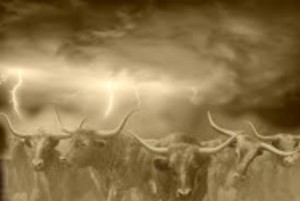By using our website, you agree to the use of cookies as described in our Cookie Policy
TELLS OF TERRIBLE STAMPEDE

From Hunter’s Frontier Times Magazine, December, 1934
DID YOU EVER see a herd of cattle that were stampeding!. If not, no pen can truly picture to you the danger and terror of such a happening. Did you ever hear a cowboy singing to his cattle? If not, it were futile to try to convey to you an idea of the peculiar crooning tone of his song—a tone akin to the peculiar tone of the southern negro's plantation song. It suggests the lullaby of a mother singing her infant to sleep.
It was a perfect day in the spring of 1869 at the Davis plantation at Montopolis ford, near Austin. In those days there were no bridges over Texas, rivers and few ferryboats. The Montopolis ford was one of the safest and best fords on the Colorado river and cattle by the thousands were crossed at that ford as they were driven to Kansas City. On this perfect day three little girls, five, seven and eleven years old were down in the orchard chasing butterflies, listening to the songs of birds, and gathering wild flowers.
After a while they climbed up into one of the tallest peach trees. Not that they were after fruit, for it was not yet ripe; but for the sheer pleasure of getting a wider view of the countryside and feeling a little nearer to the fleecy clouds which tempered the heat of the golden sunshine.
The fields were green with the corn. and the cotton.
_____________________________________
Never miss a story!
Free downloads
Join our Facebook group here
_____________________________________
Suddenly the three children heard a great roaring noise. Peeping through the foliage of the trees, they saw the negroes running toward the house. "Uncle Len", as the children called him, who was leading, was gesticulating frantically, and calling to the children. They listened and heard him saying, "You chiluns git oaten dat tree and run to de house as fas' as you little legs can take you." And Len, himself, was fleeing to safety as fast as his old legs could take him; as were all the other negroes.
The children asked no questions but obeyed instantly. As they fled to the house, they looked back and saw cattle coming up the bluff and into the field —not by dozens, but by hundreds. They heard Len saying, "Dat hol herd o' cattle has done stompeded."
The night before this event a large herd of cattle had been rested out on the prairie in front of the house. Early the next morning the cowboys prepared to cross the herd over the river.
The bluff at one point had been cut down to make a safe roadway to the. river. The cattle, rested and in good temper, wound slowly down the hill and into the stream where they stood refreshing themselves in the clear, cool water.
Suddenly, when many of the cattle had almost reached the opposite bank something happened. It will never be known why an old steer should have been possessed of an evil spirit on that perfect day, but that is the record.
The swine into whom Christ cast the unclean spirits could not have been more violent than this old steer, who began plunging, bellowing, and running back. Soon other cattle became excited and in less time than it takes to relate the story the entire herd had stampeded and were running up the steep bluff into the field and all over the field, even into the back yard.
The negroes and children reached the house just in time. Had they been a few minutes later they no doubt would have been trampled to death. Of all mad creatures, a herd of stampeded cattle is the maddest, the most violent.
All day long the cattle browsed over the farm. The cowboys rode after them, calling to them in their peculiar crooning tone.
By degrees the cattle were quieted and corralled, a few at a time, out on the prairie where they had slept the night before. Some of the cowboys stayed with these, singing to them, while others rode after the cattle that were still wandering over the field and out into the woods where some had gone by breaking through the rail fence.
By sunset the men had succeeded in corralling the herd. Exhausted as they must have been, the cowboys took turns staying awake and singing to the cattle the whole night through.
The cattle were kept corralled on the prairie for thirty-six hours. During that entire time some of the cowboys were singing their lullabies to "soothe the savage breast" of the herd. Then they crossed the herd over the river safely.
What was done with the old steer that caused all the trouble has been forgotten. No doubt lie was tied head and foot and kept behind until the herd was safely over the stream, and then quietly led over.
It is scarcely necessary to say the crops were completely ruined so that they had to be replanted. The Cowboys informed Mr. Wofford, who owned a part of the farm, that the cattle belonged to Mr. Myers who lived near Lockhart. Mr. Wofford wrote a courteous letter to Mr. Myers telling him of the damage done to his crops, and Mr. Myers paid the damages.
20,000+ more pages of Texas history, written by those who lived it! Searchable flash drive or DVD here
$129.95
‹ Back




